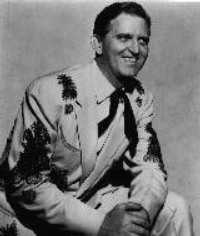(Singer, Songwriter, Guitar)
Given Name: Woodrow Wilson Sovine Date of Birth: July 17, 1918 Place of Birth: Charleston, West Virginia Married: Norma Searls (dec’d) Children: Roger, Bill, Mike, Janet Date of Death: April 4, 1980
Red Sovine gained fame for his sentimental truck driving theme recitations, but he exhibited a wide variety of vocal skills in his long musical career.
Red grew up in a poor family with Johnnie Bailes (of Bailes Brothers fame) as an adolescent companion and in their late teens, they attempted musical careers first in a band known as Jim Pike’s Carolina Tar Heels and then as a duet as "the Singing Sailors." After failing to make a living at radio, Red took a factory job and worked his way up to a mid-level management position. He never completely left music, continuing to do a program on local radio.
Meanwhile, the Bailes Brothers, who had found commercial success at the Grand Ole Opry and then at KWKH in Shreveport, Louisiana, urged Red to get back into music full-time. In 1948, he resumed his show business career, but was placed in a time slot at KWKH so early that he attracted few listeners and fewer show dates. He became so discouraged that he nearly quit the business, but Hank Williams offered to help him get a better spot at WFSA Montgomery, Alabama.
Red received a warm reception in Alabama and Williams helped his get a contract with MGM Records. He had his first session in 1949 and stayed with the company until 1953, having 28 released sides. Although he had no real hits, his musical standing was enhanced by the solid body of Honky-Tonk material he recorded. In 19449, he returned to Shreveport as star of the Louisiana Hayride. In 1952 and 1953, he and another Hayride star, Webb Pierce, had a string of Country hits that induced Red to come to Nashville to front his band and he signed with Decca.
While none of Red’s solo vocals on Decca made the charts, he scored with duets with Goldie Hill and Webb Pierce, which induced him to strike out on his own. He joined the Grand Ole Opry briefly, dropping out to tour with the Phillip Morris Caravan.
He stayed with Decca until 1959, releasing nearly forty sides and touring heavily, often playing smaller clubs. He signed with Starday Records and had his first superhit with Giddy-up Go in 1965, and eventually ranked as one of Starday’s most prolific artists. Red has left a legacy of more than 300 recordings that spanned five decades.
